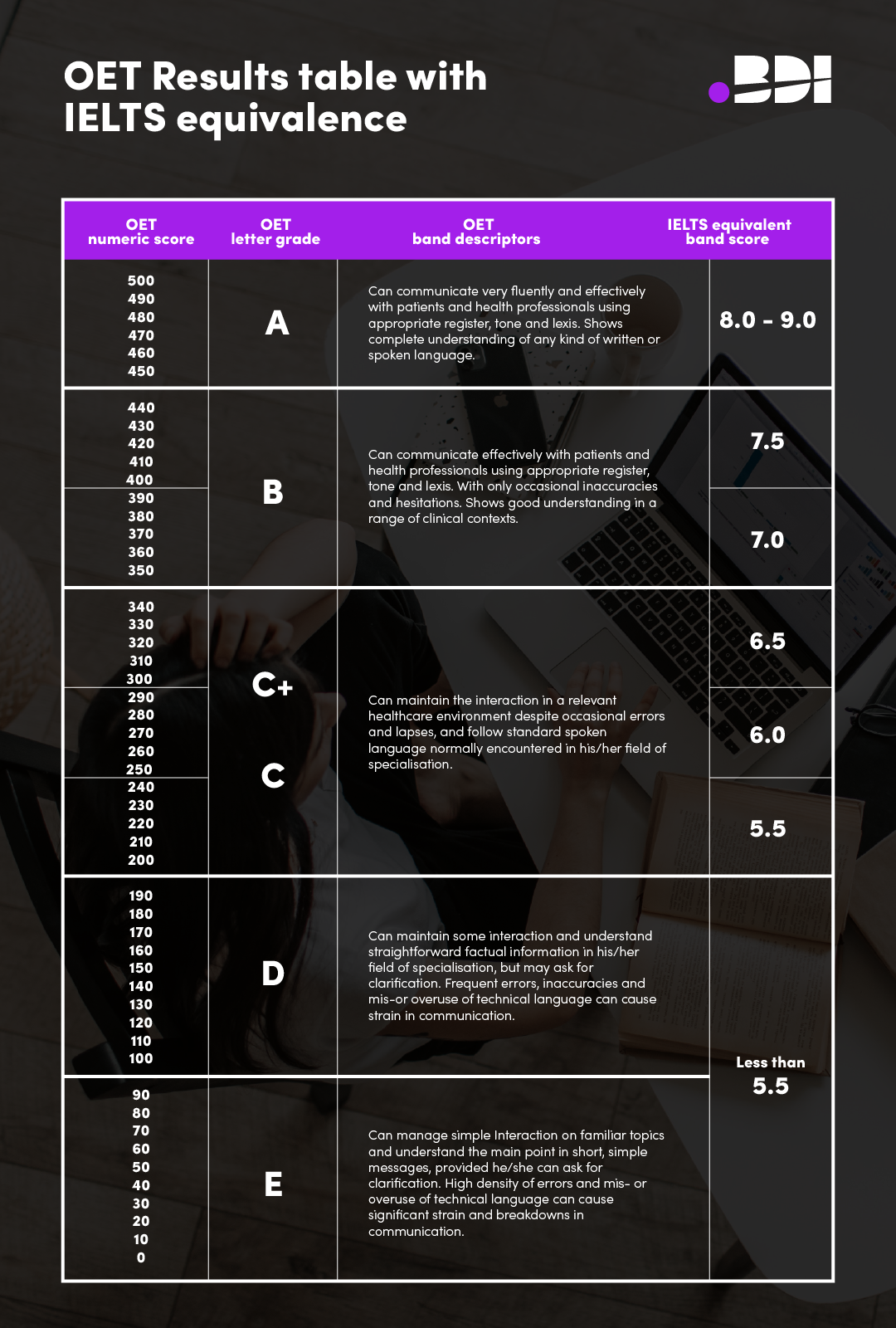OET for GMC Registration
08 Mar, 20239 Minutes
For the purpose of GMC registration, IMGs must prove their English language skills. Doing so ensures they can fully understand and communicate in English once they move and work for the NHS!
Two of the most popular GMC-approved methods for proving your English language proficiency include the IELTS and OET. In this article, we will discuss OET.
What is OET?
The OET – Occupational English Test – is an international exam that tests your English reading, writing, speaking, and listening skills. However, rather than being a general language exam, it tests your language skills particular to your profession. So, in this case, the test will be based on your specific healthcare profession.
The test costs around £329 in the UK and is available in multiple countries in over 100 locations, with at least one test happening each month. We find that IMGs tend to get on better with OET compared to IELTS due to the fact it’s focused on healthcare. With such focus, your studying doesn’t need to be as broad; instead, you can hone in on the medical language you’ll use in the UK.
OET: Test Structure
As mentioned, OET exams happen in multiple test centres worldwide. When booking on the OET website, you can choose exactly where to take the test. Likely, there’ll be a test centre that’s convenient for you.
The test itself covers four language skills in one day – reading, writing, speaking, and listening. These skills are split into their components of the test, and you’ll take each on the same day, one after another. Here is what to expect from each:
Reading – 60 minutes
The reading section comes in three parts (parts A to C) with a total of 42 questions, all based on general healthcare topics.
Part A: Expeditious Reading Task
Part A includes four short texts on one general healthcare topic where you'll need to answer 20 questions in total. These involve a combination of matching, sentence completion and short answer questions. Given that you have fifteen minutes to answer all twenty questions in Part A, this section of the test is all about scanning the text for specific information – you need to be quick!
Part B: Careful Reading Task
You get six short texts in part B. These texts are ones you might come across in a clinical setting, such as a hospital manual or memo. At the end of each text, you’ll have a single multiple-choice question to answer.
Part C: Careful Reading Task
Lastly, you’ll get two longer texts (around 800 words each) on a healthcare topic. For each of the two texts, you’ll have eight multiple-choice questions to answer.
Writing – 45 minutes
The writing section of the OET is particular to your chosen profession. For example, if you are an anaesthesiologist, your question will be based on that.
You only get one task for this part, but it requires high level English writing skills. The task is to write a letter (often a referral but sometimes an advisory letter) in English. You’ll be given surrounding documentation and instruction to assist you with constructing this letter.
Speaking – 20 minutes
The speaking section takes place in a room with just you and an interviewer for each of the 2 scenarios (also known as an interlocutor). The whole section is recorded for the examiners to review and mark later. The two role playing exercises are intriduced one at a time, last roughly five minutes each, and you get three minutes of prep beforehand.
The roleplay will be based on your profession. You’ll begin with a warm-up conversation in English before receiving a card with details about the role-play you are expected to take part in. The roleplay will be a typical clinical situation you’d experience in your chosen profession.
Listening – 40 minutes
The listening section of OET involves listening to ten recordings and then being asked 42 questions in total. The subject matter focuses on all healthcare professions rather than your specific one.
Part A: Consultant Extracts
Part A has two recordings at five minutes each. You’ll listen to a conversation between a consultant and patient, taking down notes as though you are the healthcare professional in the room. You’ll be graded on the notes you take.
Part B: Short Workplace Extracts
Part B includes six recordings at one minute each. The recordings vary but are based on situations in a typical clinical workspace. For example, you might hear a patient and healthcare professional dialogue. You’ll then answer a multiple-choice question based on each of the extracts.
Part C: Presentation Extracts
At this part, you’ll listen to two recordings that last five minutes each. The recordings can either be an interview or a presentation in a clinical setting, and you’ll answer 6 multiple-choice questions on each of them.
The OET Marking System
Every OET test gets double market by OET assessors who are randomly assigned, so you can be sure that your test gets marked with diligence and fairness.
The marking ranges from A to E (with A being the best score). The GMC requires you to get at least a B grade in each section, including reading, writing, speaking, and listening.
If you don’t reach that grade the first time you take the exam, try not to worry, as there is no limit on how many times you can take the OET. You can always try again!
OET vs IELTS
You might wonder about the difference between OET and IELTS. The main difference is the topics each covers – IELTS is a broader English language test covering a range of topics, whereas OET is profession-specific. Generally, IMGs find the OET easier as they don’t have to cover as much to pass.
It should be noted that IELTS is slightly cheaper and more widespread, occurring around four times a month compared to the OET, which takes place once a month. Some IMGs choose to take the IELTS because of its increased accessibility.
Overall the scoring system is different but you are tested to the same equivalent level as you'll see in this table:

In Summary
If you need to prove your English language skills for the GMC register, the OET is an excellent way to do so. Rather than assessing your general English skills, it will focus on healthcare and your profession, allowing you to focus your studies more.
Do you need help with how to prepare? Perhaps you’re worried about failing? Then, check out our next articles, where we go into the preparation process for both OET and IELTS.
If you’re an international doctor looking to relocate to the UK then let us do the hard work for you. We can arrange your interviews, help with CV creation and give high level interview preparation. All you need to do is contact us.


